Book contents
- Frontmatter
- Contents
- List of tables
- Preface
- List of abbreviations
- Introduction
- 1 The great family law debate
- 2 Cross-currents conservative and liberal
- 3 Arab women in the workforce
- 4 Jordanian women's liberating forces: inflation and labour migration
- 5 The Arab Gulf states: demand but no supply
- 6 Power past and future
- Bibliography
- Index
1 - The great family law debate
Published online by Cambridge University Press: 01 June 2011
- Frontmatter
- Contents
- List of tables
- Preface
- List of abbreviations
- Introduction
- 1 The great family law debate
- 2 Cross-currents conservative and liberal
- 3 Arab women in the workforce
- 4 Jordanian women's liberating forces: inflation and labour migration
- 5 The Arab Gulf states: demand but no supply
- 6 Power past and future
- Bibliography
- Index
Summary
The problem of women in the Arab world is that we don't know our legal rights – and that's very dangerous. If you don't know your rights you can't protect yourself. One reason why women don't know their rights is because they have not participated in the process of making law or enacting legislation.
Badriya al-Awadhi, Kuwaiti lawyerRarely a day went by, in the 1970s and 1980s, when an Arab newspaper or magazine appeared without an article on a ‘first Arab woman’ who had successfully entered a new field. Sample headlines ran like this: ‘The first woman broadcaster in Qatar’ (who joined the staff in the early days of Qatar radio in 1970, and who soon became head of section); ‘The youngest deputy in the Tunisian parliament’ (who was elected in the early 1980s); ‘The first Kuwaiti woman publisher’ (who began publishing political, general interest and sports magazines in 1970); ‘The first Jordanian woman pilot’ (who was reportedly the first woman in the world to pilot a Tristar); ‘The first Sudanese woman marine biologist’; ‘The first Egyptian woman film director’; ‘The first Arab woman earth satellite station manager’.
The pride and respect with which these Arab women were welcomed into the professional world was not restricted to the press. Any amazement that greeted their success was more likely to be expressed by non-Arabs than by Arabs.
- Type
- Chapter
- Information
- WomanpowerThe Arab Debate on Women at Work, pp. 9 - 37Publisher: Cambridge University PressPrint publication year: 1988



